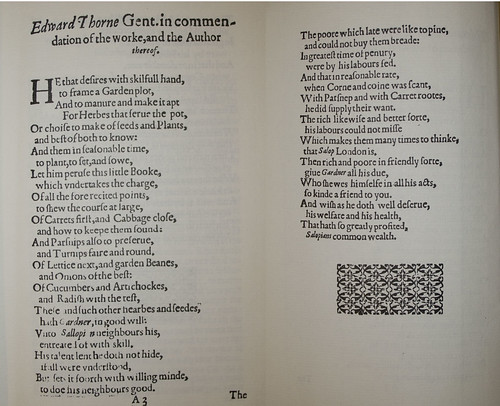 On Friday, I wandered over to the gardening books in the stacks, not sure what I was looking for really, but I found a gem.
On Friday, I wandered over to the gardening books in the stacks, not sure what I was looking for really, but I found a gem.The book is a reprint of a 1603 manuscript, "Profitable Instructions for the manuring, sowing and planting of kitchin gardens" by Richard Gardiner. References vary in the exact title and some sources list its publication as 1599. It is credited as being the first English text devoted to vegetable gardening.
The work opens with an author's preface, in which he humbles himself before both God and reader, imploring anyone who knows of better methods to share them with his neighbours for the glory of God.
Following that is another preface, in the form of a poem by Edward Thorne:
Reading it, I was immediately transported back to second year university, to my Medieval Studies class on manuscripts. Of course this book is not exactly Medieval but it is still printed in a typscript that poses a challenge to modern readers where the initial s looks like an f and the v and u are routinely interchanged. Add to that the lack of standard, accepted spelling, capitalization or punctuation and it can be quite a challenge. For the heck of it, I transcribed the whole poem/preface -- you can compare it to the original above (click to open it at Flickr) -- it's really quite a lovely opening for the book (which, itself, is an entertaining read). My transcription leaves the spelling in tact save for the v vs. u issue.
Edward Thorne Gent. in commendation of the worke and the Author thereof.
He that desires with skilfull hand,
to frame a Garden plot,
And to manure and make it apt
For Herbes that serve the pot,
Or choice to make of seeds and Plants,
and best of both to know:
And them in seasonable time,
to plant, to set, and sowe,
Let him peruse this little Booke,
which undertakes the charge,
Of all the fore recited points,
to shew the course at large,
Of Carrets first, and Cabbage close,
and how to keepe them sound:
And Parsnips also to preserve,
and Turnips faire and round.
Of Lettice next, and garden Beanes,
and Onions of the best:
Of Cucumbers and Artichockes,
and Radish with the rest,
These and such other hearbes and seedes,
hath Gardner, in good will:
Unto Sallopian neighbours his,
entreated of with skill,
His talent lent he doth not hide,
if all were understood,
But sets it foorth with willing minde,
to doe his neighbours good.
The poore which late were like to pine,
and could not buy them breade:
In greatest time of penury,
were by his labours fed.
And that in reasonable rate,
when Corne and coine was scant,
With Parsnip and with Carret rootes,
he did supply their want.
The rich likewise and better sorte,
his labours could not misse
Which makes them many times to thinke,
that Salop London is.
Then rich and poore in friendly sorte,
give Gardner all his due,
Who shewes himselfe in all his acts,
so kinde a friend to you.
And wish as he doth well deserve,
his welfare and his health,
That hath so greatly profited,
Salopians common wealth.
You'll note Thorne's use of italics for proper nouns: the author's name, shown here as Gardner instead of Gardiner and Salop/Salopians which I couldn't figure out at first. Turns out, Salop is another name for the county of Shropshire, where Shrewsbury is located, and Salopians refer to the people who live there.
I'm not done with this book yet, it's fascinating, so you may see more clips here, or elsewhere.






No comments:
Post a Comment